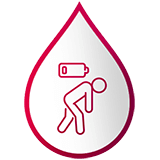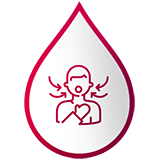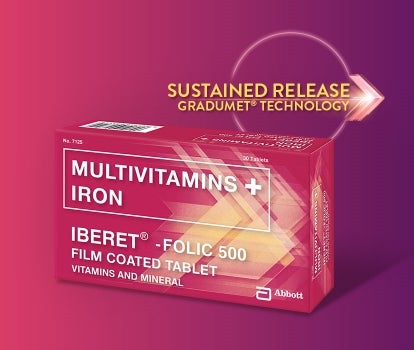PREGNANCY & IRON DEFICIENCY ANEMIA
3 in 10
pregnant women in the Philippines are anemic1.
PREGNANCY & IRON DEFICIENCY ANEMIA
During pregnancy, women need to produce more blood to support their growing baby. However, a lack of iron or certain other nutrients, means the body may not be able to produce the amount of red blood cells it needs to make the additional blood, causing Iron Deficiency Anemia.
Common symptoms include fatigue, breathlessness and poor concentration in anemic mothers
1 https://indexmundi.com/facts/philippines/prevalence-of-anemia
3 in 10
pregnant women in the Philippines are anemic1.
COMMON SYMPTOMS IN ANEMIC MOTHERS2

Fatigue

Breathlessness

Poor concentration
INCREASING DEMAND FOR IRON PER TRIMESTER3
2 Iron Nutrition During Pregnancy. https://www.ncbi.nlm.nih.gov/books/NBK235217/ Accessed 28 July 2021

First trimester
Iron requirement:
0.8 mg/day
Iron requirement:
0.8 mg/day

Second trimester
Iron requirement:
4-5 mg/day
Iron requirement:
4-5 mg/day

Third trimester
Iron requirement:
>6 mg/day
Iron requirement:
>6 mg/day
THE ROLE OF FOLIC ACID & VIT B COMPLEX4,5
Apart from iron, two other key nutrients pregnant women need are folic acid and vitamin B complex.
When the baby is developing during early pregnancy, folic acid helps form the neural tube. Folic acid is important because it can help prevent some major birth defects of the baby’s brain and spine.
Vitamin B complex plays an important role in your health and strength while your baby develops. It is also known to help with pregnancy symptoms and reduce the risk of birth defects.
HEALTH RISKS FOR ANEMIC MOTHERS6
Postpartum depression:
Increased fatigue and irritability caused by IDA, may make new mothers feel low and overwhelmed.
Birth complications:
There is a risk of preterm delivery leading to low birth weight, stunting, delayed neuro-cognitive development, and learning difficulties in newborns.
Iron supplements:
THINGS TO NOTE7,8
THINGS TO NOTE7,8
Iron supplements can significantly help reduce anemia during pregnancy, playing a vital role in reducing maternal morbidity and mortality.
However, side effects like diarrhea, nausea, vomiting, constipation and abdominal cramping may occur.
Here’s how to manage them:
1
Take iron supplements in smaller amounts if nausea and vomiting occur.
2
Try a stool softener if constipation is a problem.
3
Slow-release iron pills may be gentler on the stomach, for example Multivitamins + Iron (Iberet® Folic 500), has Sustained Release Gradumet® Technology that helps reduce gastric irritation.
4
Calcium should NOT be taken at the same time as iron. Also avoid milk, antacids, high-fiber foods and caffeine.
5
Take iron supplements with a small amount of food.
DIAGNOSING IRON DEFICIENCY ANEMIA

What are my iron levels?

What are the risks? Short-term and long-term?

How serious is it?

What are the tests that I should take?

What’s the most likely cause of my symptoms?

What is causing my iron deficiency?

What symptoms should I watch out for?

Are there other possible causes of my symptoms?

What are my treatment options?

How long will the treatment take?

Are there any side effects?

What foods should I eat to increase my iron level? What foods to avoid?

How do I prevent IDA from happening again?
For the proper treatment and care, it is best to consult your doctor if you think you may have Iron Deficiency Anemia. Here’s a handy, downloadable list of questions to ask your doctor at your visit.
RECOMMENDED PRODUCT

RECOMMENDED PRODUCT

Blood booster iron supplement prescribed by doctors for pregnant women